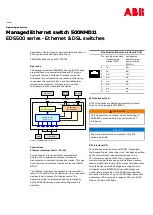
– 220 –
C
HAPTER
8
| Spanning Tree Algorithm
Configuring Multiple Spanning Trees
C
ONFIGURING
M
ULTIPLE
S
PANNING
T
REES
Use the Spanning Tree > MSTP (Configure Global) page to create an MSTP
instance, or to add VLAN groups to an MSTP instance.
CLI R
EFERENCES
◆
"Spanning Tree Commands" on page 861
C
OMMAND
U
SAGE
MSTP generates a unique spanning tree for each instance. This provides
multiple pathways across the network, thereby balancing the traffic load,
preventing wide-scale disruption when a bridge node in a single instance
fails, and allowing for faster convergence of a new topology for the failed
instance.
By default all VLANs are assigned to the Internal Spanning Tree (MST
Instance 0) that connects all bridges and LANs within the MST region. This
switch supports up to 33 instances. You should try to group VLANs which
cover the same general area of your network. However, remember that you
must configure all bridges within the same MSTI Region (
page 207
) with
the same set of instances, and the same instance (on each bridge) with the
same set of VLANs. Also, note that RSTP treats each MSTI region as a
single node, connecting all regions to the Common Spanning Tree.
To use multiple spanning trees:
1.
Set the spanning tree type to MSTP (
page 207
).
2.
Enter the spanning tree priority for the selected MST instance on the
Spanning Tree > MSTP (Configure Global - Add) page.
3.
Add the VLANs that will share this MSTI on the Spanning Tree > MSTP
(Configure Global - Add Member) page.
N
OTE
:
All VLANs are automatically added to the IST (Instance 0).
To ensure that the MSTI maintains connectivity across the network, you
must configure a related set of bridges with the same MSTI settings.
P
ARAMETERS
These parameters are displayed in the web interface:
◆
MST ID
– Instance identifier to configure. (Range: 0-4094)
◆
VLAN ID
– VLAN to assign to this MST instance. (Range: 1-4093)
◆
Priority
– The priority of a spanning tree instance. (Range: 0-61440 in
steps of 4096; Options: 0, 4096, 8192, 12288, 16384, 20480, 24576,
28672, 32768, 36864, 40960, 45056, 49152, 53248, 57344, 61440;
Default: 32768)
Summary of Contents for LGB6026A
Page 6: ...ABOUT THIS GUIDE 4...
Page 40: ...38 CONTENTS...
Page 60: ...58 SECTION I Getting Started...
Page 86: ...84 SECTION II Web Configuration Unicast Routing on page 517 Multicast Routing on page 575...
Page 162: ...160 CHAPTER 5 Interface Configuration VLAN Trunking...
Page 196: ...194 CHAPTER 6 VLAN Configuration Configuring MAC based VLANs...
Page 204: ...CHAPTER 7 Address Table Settings Clearing the Dynamic Address Table 202...
Page 238: ...CHAPTER 11 Class of Service Layer 2 Queue Settings 236...
Page 254: ...252 CHAPTER 12 Quality of Service Attaching a Policy Map to a Port...
Page 448: ...446 CHAPTER 16 Multicast Filtering Multicast VLAN Registration...
Page 470: ...468 CHAPTER 17 IP Configuration Setting the Switch s IP Address IP Version 6...
Page 576: ...574 CHAPTER 21 Unicast Routing Configuring the Open Shortest Path First Protocol Version 2...
Page 606: ...604 CHAPTER 22 Multicast Routing Configuring PIMv6 for IPv6...
Page 620: ...618 CHAPTER 23 Using the Command Line Interface CLI Command Groups...
Page 672: ...670 CHAPTER 25 System Management Commands Time Range...
Page 692: ...690 CHAPTER 26 SNMP Commands...
Page 700: ...698 CHAPTER 27 Remote Monitoring Commands...
Page 854: ...CHAPTER 34 Port Mirroring Commands Local Port Mirroring Commands 852...
Page 862: ...860 CHAPTER 36 Address Table Commands...
Page 958: ...956 CHAPTER 40 Quality of Service Commands...
Page 1034: ...1032 CHAPTER 42 LLDP Commands...
Page 1044: ...1042 CHAPTER 43 Domain Name Service Commands...
Page 1062: ...1060 CHAPTER 44 DHCP Commands DHCP Server...
Page 1206: ...CHAPTER 47 IP Routing Commands Open Shortest Path First OSPFv3 1204...
Page 1250: ...1248 SECTION IV Appendices...
Page 1256: ...1254 APPENDIX A Software Specifications Management Information Bases...
Page 1278: ...1276 COMMAND LIST...
















































